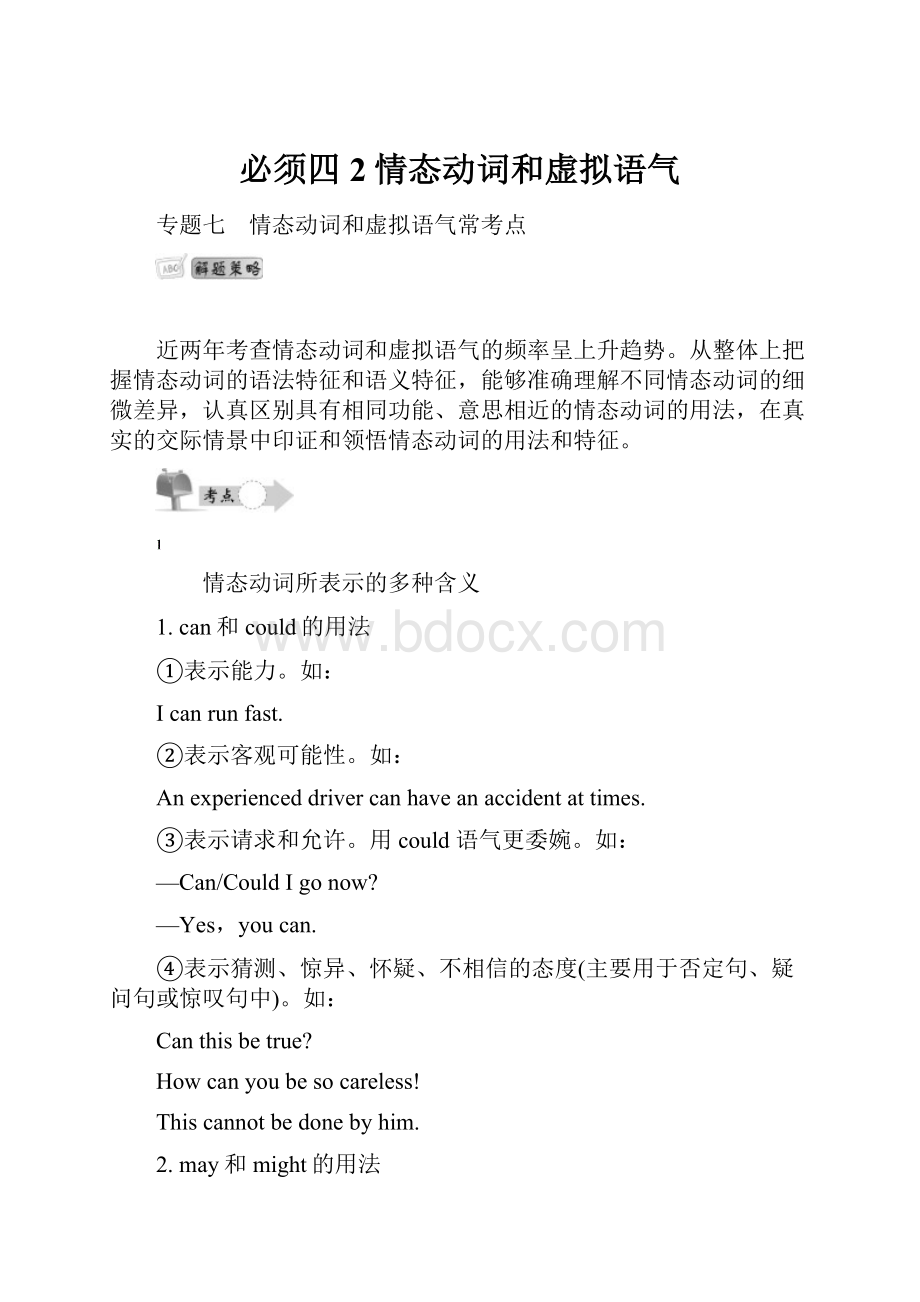必须四2情态动词和虚拟语气.docx
《必须四2情态动词和虚拟语气.docx》由会员分享,可在线阅读,更多相关《必须四2情态动词和虚拟语气.docx(24页珍藏版)》请在冰豆网上搜索。

必须四2情态动词和虚拟语气
专题七 情态动词和虚拟语气常考点
近两年考查情态动词和虚拟语气的频率呈上升趋势。
从整体上把握情态动词的语法特征和语义特征,能够准确理解不同情态动词的细微差异,认真区别具有相同功能、意思相近的情态动词的用法,在真实的交际情景中印证和领悟情态动词的用法和特征。
情态动词所表示的多种含义
1.can和could的用法
①表示能力。
如:
Icanrunfast.
②表示客观可能性。
如:
Anexperienceddrivercanhaveanaccidentattimes.
③表示请求和允许。
用could语气更委婉。
如:
—Can/CouldIgonow?
—Yes,youcan.
④表示猜测、惊异、怀疑、不相信的态度(主要用于否定句、疑问句或惊叹句中)。
如:
Canthisbetrue?
Howcanyoubesocareless!
Thiscannotbedonebyhim.
2.may和might的用法
①表示许可。
如:
Youmaydrivethecar.
—May/MightIuseyourpen?
—No,youmustn't.
②用于祈使句中表示祝愿。
如:
Mayyousucceed!
③表示推测、可能(疑问句不能用于此意)。
表推测的might并不是指过去时间,而表示比may把握性略小些。
如:
Hemaybeverybusynow.
④用于表示目的或让步状语从句中。
如:
Nomatterwhatdifficultiesyoumaycomeacross,youshouldn'tgiveup.
3.will和would的用法
①用于各种人称,表示“意志”“意愿”“决心”等。
如:
Itoldhertostopcrying,butshejustwouldnotlisten.
②用于第二人称的疑问句,表示说话人向对方提出请求。
用would比用will语气更客气。
如:
Will/Wouldyoupleasekeepthedooropen?
③表示真理或习惯,意为“惯于,总是”。
如:
Shewilllistentomusicaloneinherroomforhours.
Hewouldgetupearlywhenhelivedinthecountry.
4.should的用法
①表示现在或将来的责任或义务,意为“应该,应当”,这时它可以和oughtto,besupposedto互换使用。
如:
Youshould(=aresupposedto)completeyourtestintime.
②表示有较大可能实现的猜测、推论,通常意为“可能;总该……吧”,相当于beexpectedto。
如:
Theyshouldbehomebynow,Ithink.
③用于第一人称时可以表示说话人的一种谦逊、客气、委婉的语气。
如:
Ishouldthinkitwouldbebettertotryitagain.
④用在条件状语从句中,表示语气较强的假设,意为“万一”,这时也可将should置于从句之首,即将should放在主语前面,而省略从属连词if,主句谓语却不一定用虚拟语气。
如:
ShouldI(=IfIshould)befreetomorrowIwillcome.
⑤用来表示意外、惊喜或者在说话人看来是不可思议的。
尤其在以why,who,how等开头的修辞疑问句或某些感叹句中常常意为“竟会,居然”。
如:
Agentlemanlikehimshouldberudetoalady!
⑥用于虚拟语气句中(略)。
5.oughtto的用法
表示应该、推测,相当于should。
如:
Yououghttotakecareofhim.
6.shall的用法
①用于第二、三人称,表示说话人的意愿,有“命令”“警告,威胁,强制”“法令条文规则”和“允诺”等意思。
如:
YoushallhavethebookwhenIfinishreading.(表允诺)
②在疑问句中,shall用于征求对方的意见或请求指示,常用于第一、第三人称。
如:
Shallwegooutforawalk?
Whereshallhewaitforus?
7.must的用法
①表示义务、意图或建议,意为“必须,应该,禁止(用于否定句中)”。
如:
Youmustgoandseethatfilm—you'dreallyenjoyit.
②表示推测,意为“必定,一定”。
[注]must表示推测时的否定式是can't或couldn't(不可能)。
③表示主张,意为“硬要,一定要”。
如:
Ifyoumustgo,atleastwaittilltherainstops.
④表示与说话人愿望相反,意为“偏要”。
如:
Themachinemustbreakdownatthisbusyhour.
8.need和dare的用法
①need作“必要”讲时,既可作情态动词,也可作实义动词。
作实义动词时后面的动词不定式要带to,其变化与一般动词相同。
作情态动词时,仅用于否定句或疑问句中。
②dare作为情态动词时,仅用在疑问句、否定句和条件从句中。
dare若作实义动词,后面可接带to的不定式,此时to也可以省略。
dare与need的用法相似。
如:
Hedarestogotherealone.
Heneedstogotherealone.
Shedoesn'tdare(to)askherfather.
Shedoesn'tneedtoaskherfather.
Hedaren'tspeakEnglishbeforesuchacrowd,darehe?
9.usedto的用法
usedto表示过去的习惯动作或状态,现在已不存在,在间接引语中,其形式可不变。
在疑问句、否定句、否定疑问句或强调句中,可有两种形式。
疑问句
·Didyouusetogotothesameschoolasyourbrother?
·Usedyoutogotothesameschoolasyourbrother?
否定句
·Iusedn'ttogothere.
·Ididn'tusetogothere.
否定疑问句
·Usen'tyoutobeinterestedinthetheatre?
·Didn'tyouusetobeinterestedinthetheatre?
其反意疑问句或简略回答中,也有两种形式:
Sheusedtobeveryfat,didn'tshe?
(正式)/use(d)n'tshe?
(口语)
—Usedyoutogetupearlyinthemorning?
—Yes,Idid(正式)./Yes,Iusedto.(口语)
10.wouldrather(not)do 宁愿(不)做
11.hadbetter(not)do 最好(不)做
①I________oftengofishingwhenIlivedinthecountryside.
A.shouldB.would
C.couldD.might
②I'vedecidedtotakethejobandI________changemymind.
A.mustn'tB.can't
C.won'tD.maynot
③“Whateveryouwant,you________haveitonconditionthatyougetthebestresult,”saidtheboss.
A.wouldB.oughtto
C.shallD.could
④—Why________youstayinthecountryside,whereit'snotconvenienttogoshopping?
—ButI'vefounditrathervaluableformyhealth.
A.canB.must
C.mayD.shall
⑤—Ipromiseherdaughter________getanicepresentonherbirthday.
—Willitbeabigsurprisetoher?
A.shouldB.must
C.wouldD.shall
⑥Shejustcouldn'tbelievethatherhusband,towhomshehadbeenloyalforsomanyyears,________desertherafterhebecamerich.
A.mightB.should
C.shallD.must
⑦—AMr.Smithiswaitingoutsidefortheappointmentwithyou.________hecomein?
—Yes,pleaselethimin.
A.ShallB.May
C.WillD.Need
⑧Heisalwaysontimeforwork.How________itbethathewaslateyesterday?
A.canB.might
C.mayD.must
⑨—Lucydoesn'tmindlendingyouherdictionary.
—She________.I'vealreadyborrowedone.
A.can't
B.mustn't
C.needn't
D.shouldn't
【答案】①B ②C ③C ④B ⑤D ⑥B ⑦A ⑧A ⑨C
表示“推测”的情态动词
肯定句中用must,may,might,could,当表示理论上的可能性时也可用can;
否定句中用can,may,might,could;
疑问句中用can,could。
用适当的情态动词填空:
①________hebeapoliceman?
②He________beapoliceman,butIamnotsure.
③He________beapoliceman,forheissoshort.
④He________beapoliceman,forheisstrongandbrave.
【答案】①Can ②may/might/could ③can't ④must
情态动词的完成式
①musthavedone表示一定做了某事,只用于肯定句中。
如:
Hemusthavebeenabraveboytenyearsago.
②can/couldhavedone用于否定句和疑问句中表示推测。
③couldhavedone用于肯定句中表示本可以做而事实上未做到,含有委婉批评或遗憾之意。
如:
Icouldhavecomeontime,butmycarbrokeontheway.
④may/mighthavedone表示可能做了某事,用于肯定句和否定句(意为“可能不”)中。
⑤mighthavedone也可以表示本可以做而事实上未做到,含有委婉批评或遗憾之意。
如:
Shemighthavedonebetterthanthat.
⑥should(not)havedone=ought(not)tohavedone表示本应该做但没做或本不应该做但做了,含有责备或悔意。
如:
Ioughtn'ttohavescoldedherforsuchasmallthing.
A.表示“(估计)应该已经……”“大概已经……”,即对过去情况的推测。
如:
Theyleftatnine,sotheyshouldhavearrived(=probablyhavearrived)homebynow.
B.表示“竟然已经……”“居然已经……”,即表示说话人对已经出现的事态感到惊奇、惊喜、怀疑。
如:
I'msurprisedthatheshouldhavebeensofoolish.
⑦needn'thavedone表示本没必要做某事而实际上做了;
didn'tneedtodo表示本没必要做而实际上也未做。
如:
Youneedn'thavewalkedsoquicklysincetimewasenough.
⑧wouldhavedone用在虚拟语气句中,表示与过去事实相反。
如:
Ifhehadtoldmethetruth,Iwouldhavegonethere.
⑨wouldlike/lovetohavedone表示本打算做某事而实际上未做。
如:
Iwouldliketohavereadthearticle,butIwasverybusythen.
⑩hadbetterhavedone表示本来最好做某事而实际上未做。
如:
Youhadbetterhavecomeearlier,butyoudidn't.
wouldratherhavedone表示当时宁愿做了或没做。
如:
Iwouldratherhaverefusedhisoffer.
用适当的情态动词填空:
①Iwasreallyanxiousaboutyou.You________nothaveleftwithoutaword.
②Hehesitatedforamomentbeforekickingtheball,otherwisehe________havescoredagoal.
③You________nothaveseenhiminthestreetyesterday,forhehasbeentoJapan.
【答案】①should ②would/could/might ③can/could
一般疑问句中几个情态动词的提问和回答
情态动词的回答要根据具体的句意来判断。
完成下列句子:
①—NeedIgotherenow?
—Yes,you________.
—No,you________.
②—MustIdomyhomework?
—Yes,you________.
—No,you________.
③—May/MightIuseyourbike?
—Yes,you________.=Yes,you________.=Yes,please.=Sure/Certainly.
—No,you________.
④—Can/Couldyouhelpmecarrythebag?
—Yes,I________.
⑤—Will/Wouldyoucometopartytonight?
—Yes,I________.
—Sorry,butI________.
⑥—ShallItellhimaboutit?
—No,you________.Itoldhimjustnow.
【答案】①must;needn't=don'thaveto ②must;needn't=don'thaveto ③may;can;mustn't/can't ④can ⑤will;can't ⑥needn't
与情态动词有关的固定短语
①may/mightwelldo 很可能做
may/might(just)aswelldo 不妨做
②cannot/cannever...too=cannot/cannever...enough 越……越好
③wouldratherdo和hadbetterdo
④Apencilwilldo(forsth.)=Apencilwillbesuitable(forsth.)
⑤Thecarwon'tstart.=Thecarcan'tbestarted.
①Ireally________thankyouenough.It'sbeenanamazingday.
A.needn't
B.shouldn't
C.mustn't
D.cannot
②Theseareexcellentphotographsandwe________wellusetheminourmagazine.
A.can
B.could
C.must
D.may
【答案】①D ②D
must和haveto
①must表示的是说话人的主观看法,而haveto则往往强调客观需要;
②must一般只表示现在时,haveto则有更多的时态形式。
用must和haveto的适当形式填空:
①I________gonowforIhavegotameeting15minuteslater.
②Jenny________tidyuptheroombeforehermothercameback.
【答案】①haveto ②hadto
can,could和beableto的区别
①can用于现在时,could只用于过去时,beableto可用于各种时态;
②表示过去经过努力而做成某事要用was/wereableto,而不用could。
用can,could和beableto的适当形式填空:
①Althoughthefirewasbig,everyone________escape.
②Onlyinthiswaywillyou________finishtheworkintime.
【答案】①wasableto ②beableto
will,would,usedto
will,would和usedto均表示“习惯”。
①will表示不受时间限制的习惯性动作;
②would表示过去习惯性的动作,但不涉及与现在情况的对比,后不能跟状态动词;
③usedto表示过去习惯的动作或状态,但这种习惯现在已不存在了。
用will,would和usedto填空:
①He________belateforschool,butnowheisseldomlate.
②She________sitforhourswithoutsayinganything.
③He________walkbytheriverinthemorningafterhegotup.
【答案】①usedto ②will ③would
虚拟语气在状语从句中的用法
虚拟条件句
主句
与现在事实相反的假设
过去时
would/could/mightdo
与过去事实相反的假设
过去完成时
would/could/mighthavedone
与将来事实相反的假设
过去时/shoulddo/wereto
would/could/mightdo
①错综时间条件句(动词的形式要根据它所表示的时间作出相应的调整)。
②if省略句(在条件句中可省略if,把were,had,should提到句首,变为倒装句)。
③用介词或介词短语代替条件状语从句。
常用的有with,without,butfor。
④含蓄条件句。
用otherwise或but来体现虚拟语气。
用所给词的适当形式填空:
①Ifyou________(go)tobedearlierlastnight,you________(notbe)sleepynow.
②Ifyou________(notattend)themeetingyesterday,you________(notmeet)him.
③I________(be)illyesterday.Otherwise,I________(go)there.
④I________(give)youmorehelp,butIwastoobusy.
⑤ButfortherainlastSunday,we________(have)apicnic.
【答案】①hadgone;wouldn'tbe ②hadn'tattended;wouldn'thavemet ③was;wouldhavegone ④wouldhavegiven
⑤wouldhavehad
asif/asthough的用法
asif/asthough引导的从句表示的情况可能会发生用陈述语气,表示的情况不可能发生则用虚拟语气。
用所给词的适当形式填空:
①Itlooksasifit______________(rain).
②HespeaksChinesesofluentlyasifhe________(be)aChinese.
③Theytalkedasifthey______(be)friendsformanyyears.
【答案】①isgoingtorain ②were ③hadbeen
Ifonly...!
句型的使用
Ifonly+句子=HowIwish+that从句,句中用虚拟语气。
用所给词的适当形式填空:
①IfonlyI________(be)aflyingbird!
②IfonlyI________(go)hometomorrow!
③LookattheterriblesituationIamin!
IfonlyI________(follow)youradvice.
【答案】①were ②wouldgo ③hadfollowed
虚拟语气在名词性从句和固定句型中的使用
①表示建议、愿望、命令等词的名词性从句中,常见的词有de